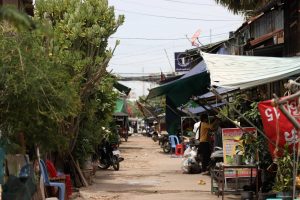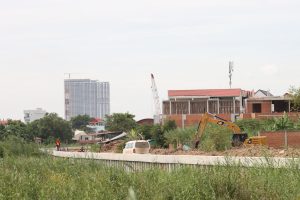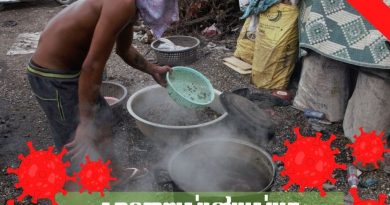An overview of the situation
In early August 2022, 320 families in Phnom Penh’s Kilometer 6 commune (known hereon as the railway community) accepted a land compensation package, administered by local authorities, through a lucky draw. This land dispute was caused by a development project: to build a 12-meter-wide concrete road, as well as a drainage system, by the old train tracks. The new road will run from Tuol Kork district to Russey Keo via Daun Penh causing the eviction of the railway community. Following a number of advocacy efforts and negotiations, the Russey Keo district’s administration set up a lucky draw, to allocate each affected family with a plot of land, in a nearby area along the O Veng Canal of Boeung Salang, also in the Russey Keo district.
Each family received a plot of land of 4 meters x 15 meters without any monetary compensation. This resolution came after a decade of community and activist-led advocacy, as members of the railway community relentlessly defended their right to land and adequate housing. The community is primarily concerned that the infrastructure for their new homes will not be built any time soon, as many parts of the site have only just been filled with soil to make way for house construction.

Site visit and discussion with community leader and members
Following the acceptance of the plots of land, STT went to visit the relocation sites to investigate the situation. Some parts of the site had already been demarcated for the railway community residents. However, none of the families have moved to the new location site yet due to its unreadiness. It was also noted that there are no clean water or electricity outlets in place. The road in front of the allocated plots of land has not been developed either, it is currently covered in gravel.

One of the community leaders told STT that even though families accepted the compensation, they made a public request at a press conference, calling the City authorities to provide extra financial and material support. Families need money for transporting construction materials, construction costs, clean water and electricity connections, land titling, and so on. The next step will be to ask for land title registration. The community leader has stressed that this is of utmost urgency, and he is currently seeking support from the City and local authorities.
On the 9th of August 2022, a few other community members expressed relief that the government authorities provided them with some compensation. However, they are still concerned over the lack of financial help for rebuilding their homes on the plots of land along the canal. Community members expressed the same apprehension as the community leader, with regards to access to water, electricity, and land titling. One concern for STT is that these communities will approach Micro-Finance Institutions to ask for loans to build their new homes. Many NGOs including STT have documented predatory practices undertaken by MFIs in Cambodia. If loans are taken out to build houses, the poor will face further challenges.

Key legal instruments to ensure the quality of relocation
The right to adequate housing is guaranteed by a list of national laws and regulations, as well as international human rights instruments. Firstly, Article 25 of the Universal Declaration of Human Rights provides that everyone is entitled to the right to housing. This is elucidated further in the International Covenant on Economic, Social and Cultural Rights, which states, under Article 11, that governments must take “appropriate steps” to ensure the realization of this right. However, the relationship between eviction, resettlement and human rights is not clearly delineated here.
The Constitution of Cambodia (1993) recognizes the importance of human rights, notably those stipulated in the Universal Declaration of Human Rights and the International Covenant on Economic, Social and Cultural Rights, through Article 31. With regards to eviction and resettlement, Article 44 of the Constitution outlines the right to land, stressing that land ownership in Cambodia is a right reserved to all Khmer citizens.
The “Circular on Resolution on Temporary Settlements on Land Which Has Been Illegally Occupied in The Capital, Municipal and Urban Areas,” more commonly known as “Circular 03,” is a government policy aimed to help address urban land disputes. Circular 03, signed off in 2010, is a dispute resolution mechanism for communities said to be occupying public space, private state land, or private company-owned land, in confrontation with authorities.
The Government of Cambodia also set up the “National Housing Policy” in 2014. This is a further step towards the realisation of the right to housing for Cambodian citizens, especially the urban poor. This policy acknowledges that the right to housing is a human right, by outlining requirements for house construction, upgrading, and financing. The housing policy emphasises the need for good housing governance in conjunction with proper land-use planning.
Finally, the “Human Rights Commentary and Guidelines on Eviction and Resettlement” published by the Office of the High Commissioner for Human Rights to Cambodia (OHCHR,) outlines the rights of individuals which need to be respected during eviction and relocation processes. Although it carries no legal weight, and it is unclear if authorities are aware of its existence, it is an important tool to help outline key principles that must be upheldto respect human rights norms and standards during eviction processes. Most importantly, the guideline stipulates that “All resettlement measures, such as the construction of homes, the provision of water, electricity, sanitation, schools, access to roads, and the allocation of land, shall adhere to internationally recognized human rights principles.”
Conclusion
The Phnom Penh Kilometer 6 commune’s right to adequate housing should be respected and protected under domestic and international laws. Plots of land provided by the City authorities are not enough. The community’s need for material and construction costs, basic infrastructure such as roads, connection to electricity and clean water, should be provided by the authorities. As it stands, the government and the authorities are not fulfilling their legal obligations to provide adequate compensation for the affected communities. Furthermore, the relocated families need to be given land titles once all other basic needs are covered.





